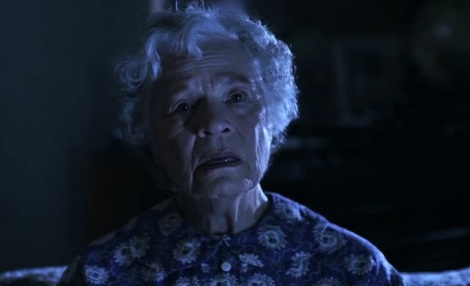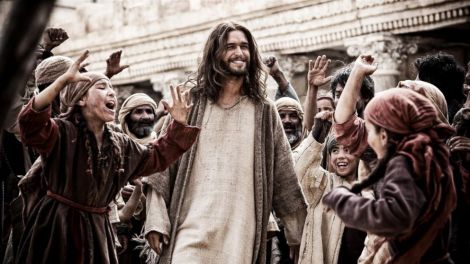At its highest level, cinema can serve as a religious experience. It can strengthen our spiritual connection to the world around us while bringing us closer to life’s mysteries, illuminating what would otherwise be intangible. Countless great artworks have been fueled by the faith of their creators, and film history has no shortage of them. Yet what separates art from mere propaganda? The answer is suggested in Roger Ebert’s oft-quoted line, “It’s not what a movie is about, it’s how it is about it.” I’ve often found that the most powerful films are also the most personal, regardless of their subject matter. It’s impossible to make a definitive film about Jesus Christ (for who can say what went on in His head?), but it is possible to make a film about how one relates to Jesus, thus making His journey resonate on a human level. Mel Gibson conveyed the physical toll of Jesus’ sacrifice in “The Passion of the Christ,” while Martin Scorsese examined the psychological toll in “The Last Temptation of Christ,” yet the true subject of these pictures were Gibson and Scorsese, respectively.
About seven years ago, I did a story for my college paper about Fox Faith, a short-lived distribution arm of Twentieth Century Fox that released films targeting an evangelical Christian demographic. Apart from being poorly made, I found many of their movies to be abhorrently patronizing. I’ll never forget how one of them (“The Ultimate Gift”) had an end credit roll that literally spelled out the film’s various morals, each accompanied by a childish illustration. Another one (“The Last Sin Eater”) was as joyless as it was amateurish. How, I wondered, could these films ever hope to evangelize? They only seemed interested in preaching to the choir of Christians more concerned with their message than any semblance of persuasive artistry. As religious cinema, they left me disillusioned and depressed.
In just the last several months, an assortment of independent filmmakers have achieved the success that forever eluded Fox Faith. Numerous grassroots productions have screened in theaters located not in big cities but small towns and suburbs (many of them found in the South). These films don’t have big budgets, big names and are usually not screened for critics. And yet, they have struck a chord with American audiences, proving that there is a hunger for pictures that cater to a spiritually convicted crowd routinely ignored by Hollywood. The target audience is, again, evangelical Christians, only this time, they’re turning out in droves. Rather than turn a blind eye to this trend, I decided that it is my duty as a film critic, a champion of indie cinema and a longtime churchgoer to see these films for myself, analyzing their worth both as works of art and evangelism tools. I’ve narrowed my focus down to four of the most notable titles, though there are plenty more worth one’s consideration.
Son of God
Inoffensive to the point of blandness, this big screen remix of executive producer Mark Burnett’s enormously popular and critically reviled TV miniseries, “The Bible,” reuses scenes involving Jesus (Diogo Morgado) and adds some additional footage to pad out the running time. The result is perfectly watchable but strangely soulless, never quite transcending its small-scale production values. However, the film is at its strongest when director/co-writer Christopher Spencer devotes screen time to Jesus’ ministry and His relationship with the apostles, portrayed by a uniformly fine ensemble. This provides crucial context sorely lacking from Gibson’s film, yet as soon as the crucifixion inevitably materializes on the horizon, Spencer’s picture pales conspicuously in comparison. With his pearly smiles and flat line delivery, Morgado is thoroughly uncharismatic in the lead role (I didn’t believe him for an instant). Roma Downey, Burnett’s wife and fellow producer, is also regrettably miscast as the Virgin Mary, considering her multiple Botox injections are in direct conflict with her character’s apparent lack of vanity.
At least Spencer had the good sense to edit out the miniseries’ controversial footage of Jesus being tempted by Satan, who reportedly bared a suspicious resemblance to President Obama. There’s nothing overtly politicized in this feature-length cut and there are some touching sections that would’ve been more emotionally stirring had they not been done much better many, many times before. I liked when a bewildered apostle muttered, “No…no…” with deadpan astonishment as he gazed upon the resurrected Jesus. It felt real and I wished the film had more moments like it. In keeping with its evangelistic aim, the film ends with Jesus urging His apostles (and, by extension, the audience) to spread the word of God across the entire world. This would’ve been more effective had Jesus not sounded so much like a coming attractions narrator (when He promises, “I’ll be coming soon,” you half-expect Him to follow it up with, “to a theater near you”). CeeLo Green performs “Mary Did You Know” over the end credits just long enough to make one ponder what a Christian version of his most famous song would sound like (“Bless You and bless you too…”).
Released in theaters: February 28, 2014
Theatrical Gross to Date: $59.7 million
God’s Not Dead
Harold Cronk’s enormously popular piece of blatant propaganda is a film fueled by anger. It was made in response to various legal cases alleging discrimination of college students on the basis of their Christian beliefs. These cases are listed in the end credits and are followed by a plug for the conservative nonprofit group, Alliance Defending Freedom, urging viewers to contact them if they feel their faith is being “challenged” by others. According to a featurette included on the film’s DVD release, many of the students were shunned because they refused to endorse the rights of same sex couples. The conspicuous lack of this topical controversy in Cronk’s movie suggests that the filmmakers were frightened of their own subject matter and opted instead to stage a simple-minded morality play populated by the broadest of caricatures. All of the Christians here are pure-hearted underdogs. Everyone else is an arrogant monster whose worldview is entirely invalid. Even the worst of them secretly yearn to follow Jesus, especially once they’ve been hit by a car.
Kevin Sorbo (of “Hercules” fame) oozes satanic malevolence as Professor Radisson, an atheist who orders his philosophy students to proclaim, “God is dead,” or face certain failure. Plucky freshman Josh (Shane Harper) refuses, citing himself as a Christian. Radisson then challenges him to prove the existence of God in presentations that he will deliver at the end of each class. What follows could’ve been an intriguing inverse of “Inherit the Wind,” as Josh utilizes the words of various philosophers to defend the existence of a supreme being, while illustrating that scientific data is less substantial than scripture. Unfortunately, these scenes only make up a fraction of the film’s two-hour running time, the majority of which is devoted to increasingly awful interconnected subplots featuring some of the lamest acting and writing in recent memory. Consider the excruciating dinner date where a smug liberal journalist (Trisha LaFache) reveals to her loathsome boyfriend (Dean Cain) that she has cancer. His indignant response: “This couldn’t have waited until tomorrow?” It may be the first scene in movie history worthy of comparison to the infamous “breast cancer” exchange in “The Room.”
If there are actually professors like Radisson in the world, then they should obviously be fired, no question. A philosophy class that outlaws any discussion of religion would be a fruitless endeavor to say the least. College offers budding adults an invaluable opportunity to learn about people from different backgrounds and cultures, and those relationships enhance their understanding of the world and themselves. Too bad this film’s appalling script by Chuck Konzelman and Cary Solomon reduces every non-Caucasian to a grotesque stereotype. There’s the status-obsessed Chinese father, the abusive Islamic tyrant and the cheery black sidekick with a wise quip for every occasion. Two couples are so obscenely incompatible that it’s impossible to believe that their longterm romance existed prior to the opening fade-in. Providing would-be comic relief is Reverend Dave (David A.R. White, star of many Troma-esque vehicles for Pure Flix), whose car is repeatedly stalled by God in what amounts to a sputtering running gag. And let’s not forget the old lady who snaps out of her dementia just so she can deliver an eloquent speech damning her wayward son to hell. These vignettes are so inane that they do little more than underline Cronk’s reluctance to examine any of the issues he raises with a shred of maturity.
Though much was made of the film’s surprisingly strong box office performance, it really isn’t all that surprising once “Duck Dynasty” star Willie Robertson turns up to humbly field questions from the snotty journalist, who acts as if his show’s most polarizing content is its footage of his family “praying to Jesus.” Actually it’s the homophobic remarks of Willie’s father Phil that have been widely criticized, but Cronk once again leaves the real conflict at the heart of his film offscreen. A generous amount of screen time is also granted to the Christian pop band Newsboys, whose boisterous energy in the film’s finale was meant to uplift but only intensified the queasy rumblings in my stomach. There was an indie film made a few years ago called “The Wise Kids.” It followed three Southern Baptist teens as their identities evolved in the summer months between high school and college. Every character—the disillusioned pastor’s daughter, the devoutly religious churchgoer, the godly boy who also happens to be gay—was viewed with profound empathy and treated with the utmost respect by writer/director Stephen Cone. That was one of the best films about people of faith I’ve ever seen. This is one of the worst.
Released in theaters: March 21, 2014
Theatrical Gross to Date: $60.7 million

Connor Corum and Greg Kinnear in Randall Wallace’s “Heaven Is For Real.” Courtesy of Tri-Star Pictures.
Heaven Is For Real
One of the most spiritually impactful scenes I’ve ever experienced was featured toward the end of M. Night Shyamalan’s sole masterwork, “The Sixth Sense,” in which young Cole (Haley Joel Osment) finally opens up to his mother, Lynn (Toni Collette), about his inexplicable ability to communicate with the dead. Lynn is bewildered and unsettled until Cole reveals his encounter with her late mother, and the message that she urgently needed him to deliver. It’s a simple, heartfelt answer to a question Lynn asked while visiting her grave (“Do I make you proud?”), confirming that Cole’s powers are genuine while bringing long overdue closure to the deceased woman’s relationship with her daughter. Shyamalan’s signature solemnity never fared better than it does here, and the performances by Osment and Collette were not only worthy of their Oscar nominations, they deserved to win. It’s one of the only scenes in cinema that makes me misty-eyed every time I see it (for me, it’s right up there with the “Auld Lang Syne” sing-along at the end of “It’s a Wonderful Life”).
Nothing in Randall Wallace’s hit crowd-pleaser comes remotely close to achieving the sublime catharsis and poignance of this scene, but it does share its inherent appeal. Many people find great comfort in the concept of an afterlife and its promise of a reunion with lost loved ones. Of course, the rational mind rejects the very notion of it, but there are countless mysteries that will forever evade our abilities of comprehension. I know numerous people, many of them in my own family, who have felt the presence of a relative or friend soon after their death. These otherworldly occurrences felt wholly natural until they were reflected upon in retrospect. I was reminded of these stories as I watched pint-sized Colton (Connor Corum) recall with mumbly matter-of-factness his memories of floating above his body (lying unconscious in the hospital) before journeying to Heaven and chatting with Jesus. The kid is a welcome antithesis to the precocious zombies that typify supernaturally inclined youngster tropes. He just babbles like any other four-year-old, but it’s the things he says (and couldn’t possibly have found out by himself) that cause his father, pastor Todd Burpo (Greg Kinnear), to have a sudden crisis of faith.
Faced with such mind-boggling revelations, Burpo is unsure of how to proceed in his preaching, and it’s his uncertainty (so well-portrayed by Kinnear) that makes this film one of the few mainstream Christian releases in recent memory with the potential to reach viewers outside of its target audience. Based on the real-life pastor’s bestselling memoir of the same name, this film portrays a honey-hued world not that far off from Capra’s utopian small towns, inhabited by heroic war vets, firefighters and god-fearing family men. It’s cornball, to be sure, but it also has a quality that so many religious pictures lack: a refusal to take itself too seriously. I was surprised by how many times I actually found myself laughing out loud, such as when Burpo’s wife, Sonja (Kelly Reilly), scolds her daughter, Cassie (Lane Styles), for punching kids who were bullying Colton. “You’re supposed to turn the other cheek!” Sonja exclaims, to which Cassie replies, “I did turn his other cheek—when I hit him.”
Though the Christianity of Wallace, Burpo and their overarching message are undeniable (as evidenced in the final scene, a payoff set up by the mystifying prologue in Lithuania), there are several pointed moments designed to lessen the alienation of moviegoers who have different beliefs. In his climactic sermon, Burpo refers to Colton’s stories as his son’s vision of heaven, suggesting that one’s perception of the afterlife may be subjective. After observing the mixture of elation and unease provoked by the name Jesus, Burpo adds, “Did God insist on my vision being the same as yours? Or yours?” This pastor’s savior is not a God of judgment (but of love), nor is His existence dependent on an ignorance of science (note Burpo’s subtle linkage of biblical teachings and the theories of Einstein). What a refreshing change of pace from both the sanctimonious schlock of “God’s Not Dead” and the pervasive cynicism of endless hipper-than-thou blockbusters that render faith a four-letter word. Wallace’s film falls short of greatness, but that isn’t really its goal. It merely wants to tell a good story that will inspire viewers to look beyond the boundaries of their own earthbound rationality. Mission accomplished.
Released in theaters: April 16, 2014
Theatrical Gross to Date: $91.4 million
Persecuted
I never much liked the “Left Behind” series. When I saw the first film with Kirk Cameron, I was dismayed by its ending, which showed the good Christian characters huddling together in a church, supposedly praying for the End Times to swiftly arrive. The world outside was evil, beyond repair and existed only to be feared. When a religion causes its followers to hate the world around them rather than engage with it, that’s a surefire red flag. I’m reminded of the wise words uttered to Fräulein Maria by Mother Abbess in “The Sound of Music” prior to her big number, “Climb Ev’ry Mountain.” She says that the church walls were not meant to shut out life, for that would be tantamount to shutting out God’s path for Maria, which in this case, led to marriage and children, not celibacy in the convent. The message of fear-mongering networks like Fox News is the exact opposite (love all that is familiar, hate everything that is not), and their fingerprints are felt all throughout Daniel Lusko’s ludicrous thriller, which would be deeply disturbing if it weren’t so foolishly inept.
With a perpetual watery eyed grimace, James Remar stars as a phenomenally popular evangelist named John Luther who states right off the bat that he’s not intolerant and that he’s no better than anyone else, considering his sordid history of alcoholism and abuse. He clings to his faith in order to prevent himself from relapsing, though Lusko never adequately explores his protagonist’s inner spirituality. He’s only interested in making the man an innocent victim of a society prepared to crush him. When Luther refuses to endorse a piece of allegedly game-changing legislation known as the Faith and Fairness Act, which calls for the same religious equality already authorized by the Bill of Rights, he’s framed on rape and murder charges by the dastardly Senate Majority Leader (Bruce Davison). On the run as a fugitive, Luther’s ministry is placed under the new leadership of a self-aggrandizing pastor (played with punchable smarm by Brad Stine) who agrees to support the legislation in exchange for tax benefits. Overseeing all this is a corrupt unnamed president (James R. Higgins, delivering a hilariously contrived imitation of Bill Clinton) who washes his hands of Luther just like Pontius Pilate, thus forcing the evangelist to fulfill his prophecy (stated in an opening interview with a journalist played by Fox News anchor Gretchen Carlson) that blood must be spilled in order to preserve religious freedom.
The image destined to be irrevocably etched in viewers’ minds is that of Luther’s blood-spattered hand brandishing a pistol while a rosary is visibly wrapped between his fingers. Yet the most inflammatory dialogue is reserved for former Tennessee senator Fred Thompson as Luther’s father, who can barely mask his contempt for non-Christians, referring to those who oppose his son as “people who believe in nothing.” He also equates the persecution of Christians in America with the religious intolerance found in China, Russia and Iran. Of course, the contempt and censorship endured by modern-day people of faith would be a worthy topic for investigation, but Lusko’s film is unconcerned with matters of substance, opting instead to construct a David and Goliath battle enacted by overwrought cartoons (perhaps Lusko and Cronk had the same film teacher).
It also borrows a few too many pages from the Hitchcock playbook regarding the Master’s signature premise of “a man wrongly accused.” A silly scene where Luther, wearing sunglasses indoors, is spotted and nearly caught is lifted entirely from “North by Northwest.” A shot of blood swirling down a shower drain is snatched, without a trace of irony, from “Psycho.” By relying on derivative formula rather than creating an original and authentic vision, Lusko’s film registers as hopelessly phony from its first frame to its last. The picture’s call for tolerance is negated by its own hero, who spends the entire movie fighting for his right to remain intolerant. Such a mentality will assuredly lead embittered souls to wander indefinitely in the wilderness of their own self-righteous bigotry.
Released in theaters: July 18, 2014
Theatrical Gross to Date: $1.5 million




